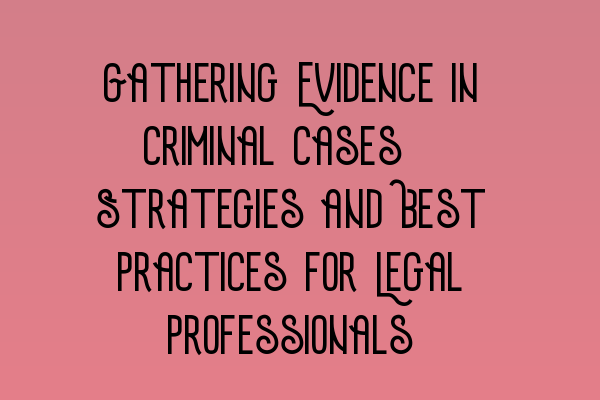Gathering Evidence in Criminal Cases: Strategies and Best Practices for Legal Professionals
When it comes to criminal cases, gathering evidence is a crucial aspect that plays a significant role in the final outcome. As legal professionals, it is important to understand the strategies and best practices involved in the process of gathering evidence. In this article, we will delve into the various techniques and methodologies that can be employed to ensure a strong and compelling case.
1. Identifying Relevant Sources
One of the first steps in gathering evidence is to identify the relevant sources that can provide valuable information for the case. This can include witnesses, documents, physical evidence, CCTV footage, and more. By thoroughly assessing the nature of the case, legal professionals can determine the most appropriate sources that need to be explored.
It is important to note that each criminal case is unique, and the sources of evidence may vary. For example, in a case involving financial fraud, it may be necessary to analyze bank records and financial transactions. On the other hand, in a murder investigation, forensic evidence and eyewitness testimonies may hold significant importance.
Related Article: Decoding Corporate Structures: A Comprehensive Legal Insight
2. Conducting Thorough Interviews
Interviewing witnesses and potential suspects is a critical component in gathering evidence. Legal professionals should approach interviews with the utmost professionalism, ensuring that the process is fair and respectful. It is essential to ask open-ended questions that encourage individuals to provide detailed and accurate information.
During interviews, legal professionals should carefully listen to the responses and take detailed notes. This information can later be used to identify inconsistencies or discrepancies that may arise during the course of the investigation. Additionally, conducting follow-up interviews, if necessary, can help uncover further evidence and strengthen the case.
Related Article: Demystifying the Solicitors Qualifying Examination Format
3. Utilizing Forensic Tools and Techniques
Forensic tools and techniques are invaluable when it comes to gathering evidence in criminal cases. These tools can include DNA analysis, fingerprinting, ballistics, digital forensics, and more. Legal professionals should collaborate with forensic experts to ensure the proper collection, preservation, and analysis of forensic evidence.
By leveraging the latest advancements in forensic technology, legal professionals can obtain critical evidence that may not be visible to the naked eye. This can significantly impact the strength of the case and provide solid support for the arguments presented in court.
Related Article: LLC Formation Made Simple: Step-by-Step Guide for UK Entrepreneurs
4. Securing Documentary Evidence
In many criminal cases, documentary evidence plays a crucial role. This can include contracts, emails, financial records, photographs, and more. Legal professionals should employ effective techniques to secure and analyze these documents. It is important to ensure that the chain of custody is maintained for all documentary evidence to ensure its admissibility in court.
Documentary evidence can often be complex and voluminous. Legal professionals should organize and categorize these documents in a logical manner. By utilizing technology-assisted review tools and techniques, they can efficiently review and analyze the documents to identify relevant information that can strengthen the case.
Related Article: LLC Formation: A Step-by-Step Guide for UK Entrepreneurs
5. Collaborating with Expert Witnesses
In some criminal cases, the expertise of specialized witnesses can be vital in gathering evidence. These expert witnesses can provide opinions and analysis in their respective fields, such as medical professionals, forensic accountants, or psychologists. Legal professionals should identify and collaborate with these experts to ensure a comprehensive understanding of the evidence.
Expert witnesses can assist in explaining complex scientific or technical concepts to the court. Their testimony can significantly enhance the credibility of the evidence and aid in the prosecution or defense of the case. It is important for legal professionals to effectively communicate and prepare expert witnesses for their testimony.
Related Article: Business Regulations in the UK: A Comprehensive Overview
Conclusion
Gathering evidence in criminal cases is a multifaceted process that requires careful planning, execution, and analysis. It is imperative for legal professionals to identify relevant sources, conduct thorough interviews, utilize forensic tools and techniques, secure documentary evidence, and collaborate with expert witnesses.
By employing these strategies and best practices, legal professionals can build a strong and compelling case that stands up to scrutiny in court. Gathering robust evidence not only ensures fair and just outcomes but also contributes to the overall credibility and integrity of the criminal justice system.
